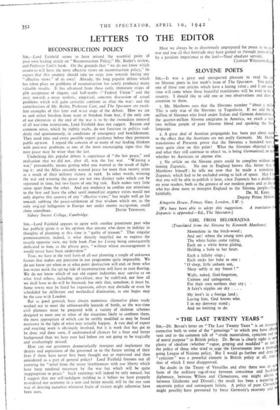SIR,—Lord Fairfield appears to agree with another prominent peer who
has publicly given it as his opinion that anyone who dares to indulge in thoughts of planning at this time is "guilty of treason." That singular pronouncement, indeed, is what directly impelled me to express the exactly opposite view, my little book Plan for Living being consequently dedicated to him, as the phrase goes, "without whose encouragement it would never have been undertaken."
True, we have at the verY basis of all our planning a tangle of unknown factors that makes any precision in our programme quite impossible. We do not know yet when or at what point destruction will end, or from what low-water mark the spr:ng tide of reconstruction will have to start flowing. We do not know which of our old export industries may survive or on what level others, including agrice.lture, may be stabilised, nor how all we shall have to do will be financed, but only that, somehow, it must be. Some towns may be fated for expansion, others may dwindle or even be scheduled for deliberate and methodical diminution, as one hopes may be the case w:th London.
But as good generals have always numerous alternative plans ready worked out to meet the unforeseeable hazards of battle, so the war-time
civil planners must be prepared with a variety of skeleton schemes
designed to meet one or other of the situations likely to confront them, the most appropriate of which can be swiftly modified as may be found necessary in the light of what may actually happen. A vast deal of expert and exacting work is obviously involved, but it is work that has got to be done and done soon, if undreamed-of chances for a finer and better background than we have ever had before are not going to be tragically and everlastingly missed.
How can our governors democratically interpret and implement the desires and aspirations of the governed as to the future setting of their lives if these have never first been thought out or expressed and then considered as a part of general policy? Lord Fairfield foresees our all yearning for "relief from the many interferences with our liberty which have been rendered necessary by the war but which will be quite inappropriate to peace." Such yearnings will indeed be only natural, but
I suggest that any self-indulgent yielding to it before we have properly re-ordered our economy in a new and better mould, will be the one sure way of denying ourselves whatever fruits of victory might otherwise have been ours. Must we always be as disastrously unprepared for peace as we are war and lose all that fortitude may have gained us through years of ba by a petulant impatience at the last?—Youe obedient servant,
CLOUGH WILLIAMS-ELL


























 Previous page
Previous page